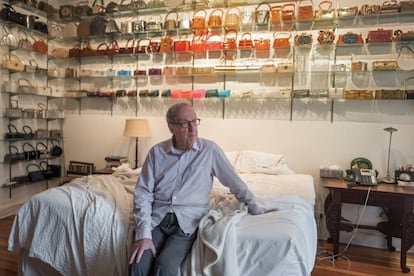Robert Gottlieb, editor revered by top writers, dies at 92
A legend of American letters, he worked with literary heavyweights such as Toni Morrison, Robert A. Caro and John LeCarré and later headed ‘The New Yorker’

Robert Gottlieb, one of the most influential editors of the 20th century, passed away on Wednesday in a Manhattan hospital. His death was confirmed by actress Maria Tucci, his wife since 1969. He was 92 years old.
In an extraordinary career at the top of the New York world of letters, Gottlieb worked with an impressive list of authors who have defined English-language literature for the last 70 years. He read and corrected the works of Nobel laureates Toni Morrison, Doris Lessing and V. S. Naipaul; novelists like Joseph Heller, John Le Carré, Salman Rushdie, Charles Portis, Edna O’Brien or Chaim Potok; storytellers like John Cheever; famous memorialists like Bill Clinton, Katherine Hepburn or Lauren Bacall; essayists like Nora Ephron and journalists like Robert A. Caro or Alma Guillermoprieto. Many considered him the editor above all others.
During his years at the service of the editorial houses Simon & Schuster, where he began working in 1955 after a period at the University of Cambridge, and Alfred A. Knopf, where he transferred in 1968 in a movement that caused an earthquake in New York’s cultural circles, Gottlieb displayed a style of his own: that of a voracious reader with great attention to detail who went out of his way to improve both the texts of their authors and to ensure their peace of mind. Gottlieb prided himself on never leaving a writer waiting more than a night, a weekend at the most, before letting him know what he thought of a recently delivered manuscript. That and his criteria made writers ask him to keep editing their books even after his retirement, and after he went over to the other side to become the third editor of The New Yorker.
His first success, and one of the great achievements of his career, was his commitment to the satirical novel Catch 22 (1961), by a then unknown writer named Joseph Heller. Gottlieb not only had the intuition to support that classic of anti-war literature and totem of the American counterculture movement, he also contributed to its title becoming a commonly used expression in the English language. It wasn’t the initial idea: Heller had named his creature Catch 18, but Gottlieb’s fear that readers would mistake it for a recent Leon Uris hit, Mila 18, made them change the number.

From there, an almost infallible career was established, with a few exceptions that made him more human: amid a cascade of great successes, Gottlieb refused to publish Larry McMurtry and, above all, A Confederacy of Dunces, by John Kennedy Toole, whom he asked for numerous revisions before deciding not to publish the novel. The author committed suicide in 1969, and the novel became a phenomenal bestseller in the early 1980s, as well as a Pulitzer Prize winner, in the hands of the Louisiana University Press.
“I have no regrets. I read the book again and came to the same conclusion,” he recalled in an interview with EL PAÍS in 2018 at his Manhattan home, an elegant four-story brownstone without an elevator but with a private park. “I recognized the enormous amount of talent and the same lot of terrible mistakes as the first time. When the boy took his own life, the mother blamed me. I suppose you can’t hold it against her, but her madness contributed to the tragic outcome.”
Gottlieb showed himself that autumn day as a man generous with his passions. “An editor’s job is, and always will be, to make his enthusiasm public,” he declared then. “The process doesn’t change: you read something, that something causes a reaction in you, and if it can be fixed somehow, you do it. What has changed is the industry. Everything was spoiled with the advent of the photocopier. The ability to easily make multiple copies of a manuscript made it possible for it to circulate among multiple publishers. The bidding began. And there it all ended. Luckily, I have had nothing to do with it for decades.”

Fortunately, his passions were never solely literary, as evidenced by his indispensable compilations of other people’s articles on jazz or dance, as well as lyrics from the great American songbook, which he titled Reading Jazz, Reading Dance and Reading Lyrics, respectively. Gottlieb, who never quite believed his luck for having shared time with the ballet choreographer George Balanchine, worked as a dance critic and advised the American Ballet of Miami.
He also collected books, which he piled on the tables and on the shelves of his homes in New York, Miami and Paris. He additionally collected jazz records, a fervent though belated hobby, and photos of dogs. And in a fetishist display, he had more than 400 plastic handbags in the upstairs bedroom. To these kitsch artifacts he dedicated the book A Certain Style The Art of the Plastic Handbag, 1949-59.
Robert A. Caro
His death also cut short one of the most amazing projects in American nonfiction near the finish line: his collaboration with Robert A. Caro. In the early 1970s Gottlieb edited Caro’s classic The Power Broker, a monumental biography of New York city planner Robert Moses from which the publisher cut out, to the annoyance of its author, around 350,000 words (even then, the final book was over 1,000 pages). Then they embarked on an even larger work: the life story of President Lyndon B. Johnson, which is also one of the great literary treatises on power.
Together they wrote, edited, and published more than 3,000 pages spread over four volumes about the man who always wanted to be president and only managed it after Kennedy’s assassination.
The world is still waiting for the fifth and final installment of The Years of Lyndon Johnson. It is not yet clear who will take over from Gottlieb, although it will be difficult for this individual to do so with the same kind of commitment. There is a documentary called Turn Every Page, directed by Lizzie Gottlieb, the editor’s daughter, who obtained permission from both of them to film them, on one condition: they would not let her record their legendary editing process, which often involved hours, even days, of discussion not just about a paragraph, but about the relevance of a semicolon.
Another one of his clients, former president Bill Clinton, defined him as “a fabulous editor and a fascinating man.”
In recent years, Gottlieb had lost the modesty that the editor usually embraces to timidly adopt the impudence of the writer. In addition to his memoirs, he wrote books on Sarah Bernhardt and Greta Garbo, as well as articles in publications such as the New York Review of Books and The New York Times literary supplement.
Sign up for our weekly newsletter to get more English-language news coverage from EL PAÍS USA Edition
Tu suscripción se está usando en otro dispositivo
¿Quieres añadir otro usuario a tu suscripción?
Si continúas leyendo en este dispositivo, no se podrá leer en el otro.
FlechaTu suscripción se está usando en otro dispositivo y solo puedes acceder a EL PAÍS desde un dispositivo a la vez.
Si quieres compartir tu cuenta, cambia tu suscripción a la modalidad Premium, así podrás añadir otro usuario. Cada uno accederá con su propia cuenta de email, lo que os permitirá personalizar vuestra experiencia en EL PAÍS.
¿Tienes una suscripción de empresa? Accede aquí para contratar más cuentas.
En el caso de no saber quién está usando tu cuenta, te recomendamos cambiar tu contraseña aquí.
Si decides continuar compartiendo tu cuenta, este mensaje se mostrará en tu dispositivo y en el de la otra persona que está usando tu cuenta de forma indefinida, afectando a tu experiencia de lectura. Puedes consultar aquí los términos y condiciones de la suscripción digital.









































